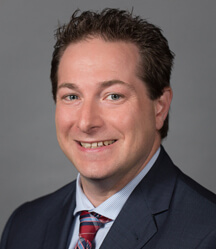Season 1 – Episode 5 – Research Integrity
The concept of research integrity refers to the best practices and guidelines that govern the professional conduct of researchers. The United States National Institutes of Health offers a broader definition of research integrity, which encompasses the use of honest and verifiable methods in proposing, conducting, and assessing research, as well as adhering to relevant rules, regulations, and professional norms. It is important for all researchers to receive training on responsible conduct of research (RCR), regardless of the source of their funding, as it is a crucial aspect of any research project.
Episode Transcript
Click to expand/collapse
Darren Gaddis: From CITI Program, I’m Darren Gaddis, and this is On Research. Today I spoke with Ross Hickey, the Assistant Provost for Research Integrity at the University of Southern Maine about research integrity.
As a reminder, this podcast is for educational purposes only. It is not intended to provide legal advice or guidance. You should consult your organization’s attorneys if you have questions or concerns about relevant laws and regulations discussed in this podcast. Additionally, the views expressed in this podcast are solely those of the guests, and do not represent the views of their employer.
Hi Ross. Thank you for joining me today.
Ross Hickey: It’s a pleasure. I’m really glad that we get the chance.
Darren Gaddis: To get us started today, what is research integrity, broadly speaking?
Ross Hickey: Oh wow. That can mean a lot of things to a lot of different people. I can give you what NIH thinks it means to start, and then we can go from there. But if you go on their website, they’ll give you three elements that they think lead to research integrity.
And the first is the use of honest and verifiable methods in proposing, performing, and evaluating research. And then they’re also looking for the reporting of research results with particular attention to adherence to rules, regulations, and guidelines. And I think that’s often what people first think about when they think of research integrity.
And then the final piece is the one I think that really is now getting more and more attention, which is following commonly accepted professional codes or norms. And I think if you look at the responsible conduct of research requirements from NIH and from NSF, they really try to distill out the nine elements that they think fit under that umbrella of research integrity. And they have been recently adding to that list as well. So there are prescribed areas that they feel are cut and ought to be.
But if you look at all of those and even the additional ones that have been added around safe research working environments, they can be boiled down into six areas. And Dr. Pimple back in 2002 wrote an article called Six Domains of Research Ethics: A Heuristic Framework for the Responsible Conduct of Research.
And that’s, I think still an article that though it’s now somewhat dated, I think really lays the groundwork practically to what research integrity means. And if you look at that, he would say that the six domains of research ethics are scientific integrity, collegiality, protection of human subjects, animal welfare, institutional integrity, and social responsibility. And I think those are still timely today.
And later on in that article he says, you can take those six and really boil it down to three questions. And those three questions are, is it true? Does the data and the conclusions really correspond to reality? Is it fair? And this is really looking at the social relationships within the world of research. And is it wise? And this gets into the idea of what is the relationship between the research agenda of a researcher and the broader social and physical world that they do their research in?
So if nothing else, to wrap this up, I would say there’s three questions that to me are always the ones you ought to be asking when you’re thinking about research integrity, which is, is it true, is it fair, and is it wise?
Darren Gaddis: And Ross, who is specifically responsible for research integrity?
Ross Hickey: Often our administration can get into the trap of thinking, “I’ve got this office of research integrity,” or sometimes they call it an office of research compliance, and they’re the ones responsible because that’s in their title, and that’s on the door in their office. And that may be a really easy trap for folks to fall into, but I think it rolls them into a false sense of security.
To really create ethical compliant operations, you have to realize that this is a charge for all of your institution. Everyone plays a part. And that starts at the leadership. And there’s really no way you can create a culture of ethics, a culture of integrity without the buy-in of your leadership, your institutional officials. They have to really set the tone.
And if you look at the Federal Sentencing Guidelines, chapter eight, that talk about what is an effective, ethical, and compliant organization. Those are not just for research compliance or research integrity. That’s for any area of compliance.
You’ll see that they are very clear in prescribing that there must be a buy-in from your leadership to support and properly make sure that there’s the right resources in place for your research integrity or your ethics to actually function within your organization. So the leadership clearly has a very important role.
But they’re not the only ones. If you look at NIH, again on their website, they list out various other groups that have a role and a responsibility. And in any Responsible Conduct of Research Training, you will want to talk about what each of these groups does to create that culture of integrity and compliance.
So you have the mentors in your organization, that are setting the example for their trainees, and those that they have a responsibility to help bring up in train. You’ve got your junior researchers that are also sharing with younger researchers and giving them a good example that they can look at. And also, making sure that they’re knowledgeable about the policies of that organization and their standard operating procedure.
And then you’ve got even those younger researchers coming along so that there’s at each tier, those senior PIs, those post docs, those younger researchers, or the junior researchers, they’re all playing their role in making sure that there is integrity in that organization.
You also have not only the role of an office of research and compliance or integrity, you also have a role of the public. I think it’s something that we don’t always talk about, but NIH mentions this in their website, that there’s a role in research integrity for the public.
And that is to really look and demand that there’s responsible conduct of scientific research, and set a high expectation that the research that we are doing is done with integrity. And also, to look to that in the research that they are reading and digesting to make sure that they appreciate that a critical part of any research that’s being disseminated for their consumption.
Darren Gaddis: How do you ensure research integrity as part of the research process?
Ross Hickey: Well, I think you’re going to see that again, in any field where there’s compliance, in any profession or area of society in which there is a regulatory aspect, that there are industry standards, it’s going to have a fair amount of uniformity.
So it’s no different in research. There’s going to be policies. There’s going to be often, standard operating procedures that get into the actual implementation of those policies. There’s going to be codes of conduct that give it a higher level, the principles and norms that that institution finds are important to, in many ways, reflect their values that they think are critical in the conduct of research.
But there’s going to be also, other elements as well. And again, going back to the Federal Sentencing Guidelines, they’re prescribed. So there’s got to be a robust method of whistleblowing to occur. In some way, there’s got to be a way for leadership or those people in positions to actually do something to know if there’s a potential issue out there.
And so there needs to be some mechanism in which when someone sees something that they are concerned about, they can communicate in a way that that information can be assessed and then a determination made.
The key piece of that, and it’s no different in research than in any other area of compliance, is that there needs to be no fear of retaliation. So you do not want folks to feel like they can’t say anything because it will harm them in a very real sense. And so anti-retaliation policies are another piece you’re going to see that any institution that is conducting research ought to have.
I think another piece you’re going to see, and I alluded to this earlier, but it’s the training. The Responsible Conduct of Research Training is required. It’s prescribed by NSF and NIH.
But again, going to the Federal Sentencing Guidelines in chapter eight, whether NIH or NSF ever required it, you ought to do that as part of your developing an ethical culture at your organization.
There’s going to be another part of this operation that involves training, and it’s going to involve something that is probably in person or interactive. But that’s not the only thing it will have. It will also involve training materials such as what CITI Program offers. That’s part of the overall program of training that most organizations implement and research.
Darren Gaddis: What happens if a researcher has an issue with research integrity within their research, and how should they handle this situation?
Ross Hickey: So I think one of the hallmarks of an effective culture of compliance, an effective culture of integrity at a research institution is that there is an empowerment of individuals to ask questions at any point of the research endeavor. And the field that they understand and know who they should be asking those questions of, or if they don’t know exactly who, that there are folks that they can go to that can point them in the right direction.
There should be in a robust program, not just an understanding of, I’ve screwed up. After the fact, who do I talk to? But before I do something, going back to those three questions that I started with, is this what I ought to be doing? Is there something I don’t understand? Is there a place that I can get some clarity so that I can truly assess if this is true, fair, or wise, to take part in this endeavor? But let’s say something happens and the mistake occurs. It’s important not to hide it. It’s important not to think that if I just ignore it, it will go away.
As time progresses, the remedial actions that can take place to try to mitigate the potential harm, not just to yourself as a researcher, not just to your organizations, but also to society. And if you remember going back to what I talked about, society has a role in research integrity. And also, there is I think a responsibility of the research to understand this is not just about them. It’s their colleagues, it’s their institution, but it’s also society and the actions that they take.
And if you get into certain areas of research integrity, human subject research, animal research, it also impacts other innocent third parties that are subjects to your research. You really need to get that information to folks sooner rather than later. And it’s almost never a good idea to think that if you just simply look the other way, it will all go away.
You may have well-meaning folks that tell you, “Let’s just look the other way.” They could be in positions of leadership. That’s where it gets really difficult to do the right thing. But I think what’s important, especially if you’re trying to establish that cultural norm at your organization, is that your researchers, wherever they are in their career path, to understand that the decision whether or not to disclose should not be one that’s kept to yourself or to your lab. There are other important people that should be part of that conversation that have been trained, and are going to ask the right questions so that in the long run, you’re able to handle this in an ethical way.
I want to say one other piece to this, which is as I said earlier in the conversation, if you go back to what is research integrity under the NIH website’s definition, following commonly accepted professional codes and norms is that third piece. Explaining and having your folks understand what those values are as I talked about. You do that through a code of conduct. I think you see that often.
But also in your trainings. And I think having provided as a supplemental training to your folks, ways for them to be able to reflect, to pause, especially in a stressful environment, and not just bulldoze ahead or move forward while they’re not thinking necessarily clearly about all the factors involved, is really important. And you’re seeing that more and more. More how can you help your folks to take time in the stressful environment that we often find research in, before they do something that when they’re thinking clearly, they probably wouldn’t do? To just pause. It doesn’t mean they’re going to then make the perfect decision or the right one. They can still make a decision that probably in hindsight was a mistake.
But what science shows us is our brains are set up in a way that the more stress we’re under, the more snap judgments we make, the more rules of thumb that we follow. That we are not always going to be mindful of all of the important ancillary factors that when you’re doing research, you’re going to have. Because research is a complicated endeavor.
So if nothing else, I think that it’s really important for institutions to help folks feel that they can take a moment to stop, reflect, ask others for advice, go to their colleagues. Again, going back to who’s responsible.
If we think of the different groups I brought up, one I didn’t really talk about, but I think is critical is that in all of those areas… So from your senior administration, to your PIs, to your postdocs, to your junior researchers, to your undergraduate researchers, that they have colleagues that value and want research integrity to be part of the norm and culture of that organization, and they can go and talk to. So they would back in the day, call it the water cooler conversations.
But that should always be a facet of research integrity, that there are colleagues that they can go to and say, “I am really under the gun. I feel like I can justify this behavior. I think it’ll be fine. What do you think?” And that is an aspect of the culture that is valued and is seen as important when you get into this situation. When you think that you’re in a situation where something has happened, that is the time to go out and reach out to colleagues, to find out what the resources are, to find out who’s in places that can help you navigate what potential rules, regulations, potentially contractual or stipulations of any type of publication could have been impacted by your decision. The sooner you do that, the better. And understand that in the long run, you’re truly making the best decision you could make to hit the pause button and get that information.
Darren Gaddis: What could happen if research integrity is ignored within a research project?
Ross Hickey: So certainly if we take the step back and we say, “How did this research project start? Where did this manifest from?” Meaning, “Why am I doing this work? Why am I testing this hypothesis? Why am I doing what I’m doing?”
You may be doing it for funding purposes. You’ve started down this path. Or I should say rather more precisely, that you have a novel question you’re testing, and you have been lucky enough to find funding to support that, because you should never chase the funding necessarily. Well, that means there’s a third party out there that likely, you’ve got responsibilities to report when an issue has manifested. Now, most funding in this country goes to the institution, not to the individual researcher. So the institution has a reporting requirement.
Once that information is communicated, they have to come up with some sort of mitigation plan. And I’m speaking in generalities, because we’re talking about not just research misconduct here. We’re talking about human subject protection, we’re talking about animal welfare. We’re talking potentially about financial conflicts of interest. All of these things could be found in an office of research integrity or compliance. So all of these in some way though, will mean that you’ve got to notify the funding source, but then potentially another federal agency that also has jurisdiction, right? And that entity’s going to want to see that this potential harm has been mitigated in some way when steps have been taken.
And so that researcher, once that information has been communicated, is now part of a larger team that has to address that. Because remember, they’re not necessarily the only person with responsibility here. Those outside entities are, and the institution that researcher works for.
That will impact their career. It will also probably impact the colleagues they work with on that research. It may impact the institution’s ability to receive funding in the future, depending on the actions that they take.
In addition, it certainly is going to have… We again, think about it from the public perspective. As that information comes out, it’s going to have an impact on the reputation of that institution. It may have an impact on the reputation of that researcher.
In addition to the responsibility of the organization, sometimes in some areas of research integrity, there’s an individual responsibility such as researcher misconduct, has a very direct impact on their ability to potentially receive future funding. So that’s one piece of the puzzle when we’re talking about the impact on the researcher.
If they’ve published, if this has gone into a peer reviewed journal and other entities have relied on what they’ve published, then you have the impact of the retraction. And again, if we think of the research as not just about the researcher, others may have relied on what they have published and their findings.
And so now, you have the impact of, again, innocent third parties who believed your research to be true. We have to go back to Dr. Pimple’s three questions, and base their research on that. So you have the impact for that journal, the impact of other researchers who utilize that. That’s another piece of this.
Then as we’ve talked about it, in that third question of is it wise, what did this mean for research? Not just the research of that individual or even at that institution. But if you see in certain cases the impact on other research in that field of inquiry, because of the behavior of that researcher. They could be at a completely different institution, but if they’re doing similar research, and there has now become this information that has come out about the mistakes made by this one research, that now impacts their ability to do research as well.
Or if it’s a group harm to a certain group, it could impact the ability to do research with a certain group because of the harm of a researcher in a field of inquiry that had nothing to do with what other researchers did in that area. And so you see the cascading effect.
Another piece to this, you could get into a lot more detail, but there are multiple ways now that the federal government, when you receive federal funding, could potentially come after the individual or their institution for fraud. And so to very simplistically say, when you enter into receiving a grant or you are awarded a grant from a federal agency, you purport to do certain things. One is to not in any way, lie, cheat, and steal to the federal government. If they believe that’s happened, they can bring allegations of fraud. Both against the institution, there’s different specific elements of fraud they could bring against them. But there’s also fraud against the individual, and that could lead to criminal charges against that person. And so that’s, I think a snapshot of what are the bad things that could potentially happen.
I’m going to add a codicil to this, which is I think where often institutions have to be very mindful. That is what happens to the complainant, the person that blows the whistle. Even if what they think is a case of bad behavior, misconduct, some sort of non-compliance. That could turn out that through the investigation, that there is no validity to that. But the institution can often harm that whistleblower in how it reacts to it and how it treats that person.
And that is often another facet of this. There’s another actor that in the way that they’re handled as the whistleblower, it has an impact on their career. And that’s really part of all of these conversations is even when they have done things in good faith and there is merit, it still could have a negative impact on their career. There’s a whole other part of this when someone brings an allegation in bad faith.
But let’s just assume that they’ve in good faith, brought something, and there’s merit and there actually is non-compliance. It still could potentially have a negative impact, and the institution has a responsibility. Again, it’s clearly articulated in the Federal Sentencing Guidelines to make sure that they mitigate any retaliation against that person.
Darren Gaddis: How can researchers learn the “best practices” for research integrity?
Ross Hickey: So there’s a lot of great resources out there. Now, some of these are geared specifically to folks in the field that are the subject matter experts that we’ve been talking about. That when you’re asking around, “Hey, I’ve got a question. I want to do the right thing.”
I want to preface before I get into that, most of the entire organizational structure in the United States around research integrity at institutions is predicated on the premise that people want to do the right thing. There will be those lone actors. There will be those “bad eggs” that may want to in some way, figure out how to work around the ethical norms of an organization.
And again, as an institution, you want to show to the outside entities that have jurisdiction if something bad happens, the person truly was a lone wolf, that they were a bad actor. And that that’s not the norm. Most of your researchers want to do the right thing. They want to behave in an ethical way. That’s really important for the organization in their overall responsibilities.
But if you look at the average researcher, where can they go to empower themselves? Well, again, hopefully the training that’s occurring at their organization is robust. It’s strong. It’s utilizing resources such as CITI that can give you a great understanding and foundation around areas like the topics in RCR.
But there’s also places they can go that again, while they’re maybe geared to the professionals in the field, there’s still resources there that they can benefit from.
There’s a lot of great material, and that’s a really practical way that they can educate themselves is by serving on the IRB, the institutional review board for other review boards that are required under the federal regulations. They can go through those serving some time on those boards, and they can get a very practical hands-on experience about how this works day-to-day. Often for financial conflicts of interest, there’s a committee that reviews those. There’s a lot of other places that they can basically volunteer at the local level. And one, they get the understanding of the regulations that are relevant. But also, they can understand how that works at their institution.
Darren Gaddis: What else should we know about research integrity?
Ross Hickey: I think that what you have to understand is that the worst thing that we can do is think that this is personified in a person who’s the research integrity officer at an institution. That this is handled by this person, and I don’t have to worry about that, or I can outsource my ethical questions to the IRB. The system was never set up for that, and that’s not how the feds are going to view it if they’re involved.
This has to be a culture that, as I said, and NIH has spelled out from the junior faculty member all the way up to the institutional official, everyone is committed and invested to making sure that we try to do the right thing. Mistakes happen. Well-meaning people, good people don’t always think clearly, as I said. Or if they are, they still can make a mistake. And I think that there needs to be an understanding of that does not mean that transparency should be foregone, that you should give up on trying to be transparent and open about what the best ethical decisions are.
That probably is the most critical time when a mistake has been discovered or when you’ve done something that you realize in hindsight was not the best decision. That’s really where the rubber hits the road of a robust program that’s focusing on ethics, that’s focusing on integrity, that wants to follow the rules and be compliant. That’s really where you’re going to see of all those years of going to trainings and taking the time to do that work, and prepare yourself, it’s going to manifest.
And I think that there’s an appreciation. It doesn’t mean there might not be some remedial actions that might be painful. But I think it’s going to help mitigate, especially if you see from the lens of an outside entity. And I think most importantly, from the public’s perspective.
Because regardless of whether you’ve got an issue with funding sources or federal agencies, it’s really critical more than ever now for research institutions to understand that the public needs to be part of this, and understand, and appreciate, and value what we’re doing now more than ever.
Darren Gaddis: Ross, thank you for joining me today.
Ross Hickey: Thank you. This has been a pleasure. I really enjoyed talking with you.
Darren Gaddis: Be sure to follow, like, and subscribe to On Research with CITI Program to stay in the know. If you enjoyed this podcast, you may also be interested in other podcasts from CITI Program, including On Campus and On Tech Ethics. You can listen to all of our podcasts on Apple Podcasts, Spotify, and other streaming services.
I also invite you to review our content offerings regularly as we are continually adding new courses, subscriptions, and webinars that may be of interest to you, like CITI Program’s new Environmental Health and Safety subscription. The Environmental Health and Safety subscription provides organizations with key content areas related to health and safety. All of our content is available to you anytime through organizational and individual subscriptions. You may also be interested in CITI Program’s Responsible Conduct of Research courses.
How to Listen and Subscribe to the Podcast
You can find On Research with CITI Program available from several of the most popular podcast services. Subscribe on your favorite platform to receive updates when episodes are newly released. You can also subscribe to this podcast, by pasting “https://feeds.buzzsprout.com/2112707.rss” into your your podcast apps.
Recent Episodes
- Season 1 – Episode 4: What is an IRB Administrator?
- Season 1 – Episode 3: Artificial Intelligence in Research
- Season 1 – Episode 2: Graduate Research and Controversial Topics
- Season 1 – Episode 1: Women Faculty Members and the Tenure Process
Meet the Guest
Ross Hickey, Esq, CIP, CPIA – University of Southern Maine
Ross Hickey is the Assistant Provost for Research Integrity at USM. He has a nationally recognized research compliance office that serves not only USM but institutions throughout the country. Ross is contacted on a regular basis to provide technical assistance on regulatory compliance and Responsible Conduct of Research matters.
Meet the Host
Darren Gaddis, Host, On Campus Podcast – CITI Program
He is the host of the CITI Program’s higher education podcast. Mr. Gaddis received his BA from University of North Florida, MA from The George Washington University, and is currently a doctoral student at Florida State University.










